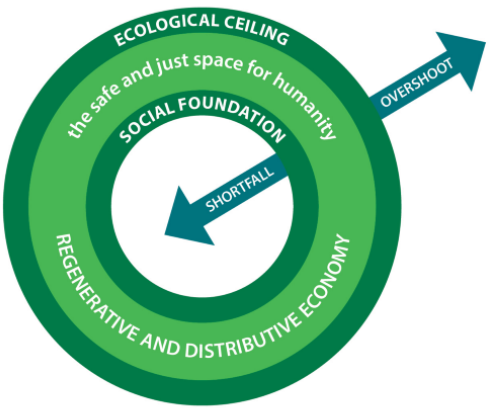Over the last six months or so, I have been trying to get a fresh perspective. I have been particularly enjoying non-fiction, and I feel like this is a good time to reflect on some emerging themes.
Without work conundrums churning in my brain, I feel like my mind is loosening up, unfurling. I have more cognitive surplus than I have had for decades. I feel I can let my mind wander. Those wanderings have led me around psychology, organisational psychology, business, economics, political economy, policy making, sociology, gender, biology, earth sciences and climate change, and also weaving between and across all these areas.
Really Interesting Books I Actually Finished …
- Doughnut Economics by Kate Raworth (actually, still gobbling this one up, and it’s what inspired me to write this post!)
- Humankind by Rutger Bregman
- The Value of Everything by Marianna Mazzucato
- Rebel Talent by Francesca Gino
- Kill it With Fire by Marianne Bellotti
- How to Find Fulfilling Work by Roman Krznaric
- Why Buddhism is True by Robert Wright
- Difficult Women by Helen Lewis
- Invisible Women by Caroline Criado-Perez
My mind was also fed by books I didn’t finish, TED Talks, Medium articles and all sorts of twitter threads, and, of course, conversations with actual people. An eclectic mix of inputs, but with some compelling recurring themes that I keep spiralling back to.
Emerging Themes
Western cultures have held beliefs and principles that are not useful to us anymore.
Mind:body dualism is not a helpful way to understand our bodies, minds and feelings.
As we understand our brains and physical systems better, we see it is all connected, messy and complex.
Sex and gender shape us and the bias towards male as a default runs deep.
We frequently negotiate borders between personal and political, home and workplace, individual and collective.
There is invisible work, unpaid work, and emotional labour which glue societies together.
Economic growth should not be our key performance indicator.
Rational economic man is a fiction.
People are driven to altruism and collectivism as well as individualism.
The dynamic between collectivist and individualist responses is key to our current times.
Trickle-down economics is a myth but many people believe it.
The contribution of the state is often overlooked.
Brave policy-making can be pivotal: think smoking ban, recycling, pandemic controls.
Policy ideas often exist on the margins for decades until their time comes.
Timing and context are key to whether good ideas get traction.
Ideas that seem strange might be the most important ideas.
Important ideas might be open patents, universal basic income, soil carbon sequestration and rewilding.
Societies are messy complex systems.
Four year political cycles limits our ability to commit to big changes.
Organisations are also messy complex systems.
Money can be made by those who promise to tame the messiness.
Models can help describe and navigate complexity but messiness is natural.
We must always remember that “the map is not the territory”
Humans tend towards groupthink.
Groupthink makes us feel safe and cohesive: it has been necessary for our evolution.
Social media is particularly powerful for amplifing groupthink.
Groupthink can be our worst enemy.
Cultures can hold beliefs about the world that limit their effective response to the world.
In new and changing situations, groupthink should particularly be avoided.
Climate change is an existential thread.
Nature is a messy complex system.
Humanity has knocked the system out of balance.
Fixing the system has to be our priority.
We need diversity of thought to tackle it, and we need to be willing to throw away beliefs about humanity that are not useful to us.
Interested in more?
Here’s some accessible and engaging entry points …
The Doughnut by Kate Raworth https://www.kateraworth.com/doughnut/ see the animations! and her TED Talk “A healthy economy should be designed to thrive, not grow”.

TED interview about the Covid 19 Crisis with Marianna Mazzucato
And if you think some of these ideas sound a bit far-fetched and left field, watch this RSA Animation on The Power of Diverse Thinking by Matthew Syed.
Finally …
What shall I read next?
This is my shortlist …
- Framers by Kenneth Cukier, Viktor Mayer-Schonberger, Francis de Vericourt
- Happy by Derren Brown
- The Happiness Trap by Russ Harris
- Physical Intelligence by Claire Dale and Patricia Peyton
- Move! by Caroline Williams
- Material Girls by Kathleen Stock
- The Promise of Access by Daniel Greene
- The Corona Crash by Grace Blakeley
… but what do YOU recommend?